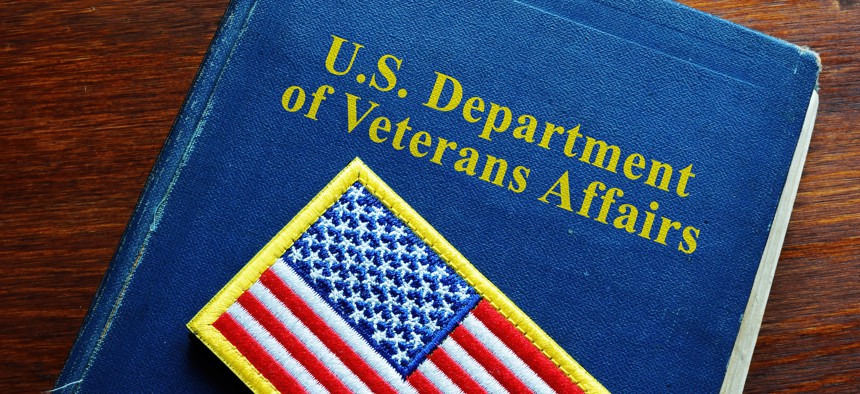VA’s New Cyber Apprenticeship Program Will Focus on Training for Underserved Veterans

designer491/Getty
The VA’s initiative, set to begin this summer, “is really designed to attract that diverse and inclusive cybersecurity talent,” a department official told Nextgov.
As part of an effort to address critical workforce gaps across government, the Department of Veterans Affairs is gearing up to launch a federal cybersecurity apprenticeship program this summer that will provide underserved veterans with the training needed to safeguard personal data and IT systems from an array of cyber threats.
In an interview with Nextgov, Nathan Tierney—VA’s chief people officer and deputy chief information officer—said the department’s new initiative is “focusing on veterans in underserved areas, folks that normally wouldn't get into the cyber field, and providing an opportunity for them to receive on-the-job training for two years.”
A shortage of high-skilled cyber professionals has affected both government and industry in recent years, exacerbating concerns about the safety of sensitive data and information from cybercriminals and increasingly emboldened nation state threat actors. A report released by a federal working group last October found that there were “more than 700,000 cyber jobs to fill nationwide and nearly 40,000 in the public sector as of April 2022.”
To help address the government’s cyber workforce challenges, federal agencies have been working to fill some of these gaps through the implementation of apprenticeship programs and other initiatives that can help individuals—often with backgrounds in the defense or technology sectors—gain the hands-on education they need to become skilled cyber professionals.
VA partnered with the Department of Labor in November 2022 to launch the apprenticeship program, which the White House referred to as a “scalable and sustainable model” that will “provide a pathway to quickly hire a diverse, underserved population of veterans into the federal government into cybersecurity roles to protect our nation’s most vulnerable systems’ dependability, integrity and data privacy.”
The initiative’s creation was announced during the Biden administration’s 120-day cybersecurity apprenticeship sprint, which sought to promote registered apprenticeships as a proven method for developing “a pipeline of skilled workers.” In a March 31 blog post, VA said its Office of Information and Technology was recognized by Labor earlier this year “for developing an innovative cybersecurity apprenticeship program” that enables veterans to “learn while they earn.”
Tierney said VA’s initiative “is really designed to attract that diverse and inclusive cybersecurity talent,” and will have a specific focus on hands-on training and skills development. The department’s goal, he added, is to strengthen its ability to safeguard veterans’ data, which will be emboldened by the work of the apprentices.
“We want to get that kind of talent that's hungry, curious, willing to learn and has the aptitude for it,” Tierney said. “And then we want to bring them on board through that apprenticeship program, give them that effective career path in cybersecurity—which helps them grow professionally—but also, more importantly, helps to serve veterans as part of the VA mission.”
VA is currently developing a strategic communications campaign to outline its recruitment and application processes for the program. Tierney said that effort will also include a more targeted recruitment drive focused on veterans that “have adjacent skill sets and interest,” such as those “that have separated from service within the last five years, as well as veterans in the VET TEC program.”
The program was originally slated to have 10 participants in its initial cohort. Tierney said, however, that VA is looking to have five veterans begin the program this summer, and then the department will determine whether to expand the size of its first group of apprentices.
“We're going to laser focus on different areas for those five,” he added. “If we can get more and beef it up to the full 10, we will before the end of the fiscal year.”
Moving forward, Tierney said VA hopes to increase the number of apprentices in the program and enhance the initiative’s scope so it can focus on “other cybersecurity-type work.”
“Right now, the initial cohort is focused on the cyber defense analyst role,” he said. “But as you look at the NICE Framework and all the other different roles out there—particularly within cybersecurity—we will evaluate it, and then we'll try to scale the program to other disciplines.”
VA adheres to a competitive hiring process, so apprentices are not guaranteed jobs upon completion of the program. Tierney said, however, that successful participants will be well positioned to leverage their training into full-time cyber roles—whether in government or in the private sector.
“I just don't see the need going away for highly trained cybersecurity specialists,” he added. “So even if a veteran comes in and they do two years of service getting trained, and they—for their own personal reasons—decide to go to the Department of Labor or to Meta, that’s fine. But I think this is where we can do a lot of good.”
Tierney said the program compliments VA’s other initiatives to fill cyber and tech vacancies across the department’s Office of Information and Technology, where roughly one-third of the employees are currently eligible for retirement. Some of the department’s other initiatives include a mentoring and coaching program and a rotational program focused on employee upskilling, as well a more robust effort to recruit high-skilled professionals who lost their jobs amid the wave of layoffs across the tech sector in recent months.
Tierney previously spoke with Nextgov in November about the department’s tech-focused recruiting efforts, noting at the time that VA has used “some backend analytics tools, through LinkedIn and some other platforms”—as well as other forms of targeted outreach—to identify top-tier candidates to fill approximately 1,000 tech-related vacancies across the department.
Tierney provided an update on these ongoing recruitment efforts, saying that VA has been able to fill roughly 91% of targeted vacancies through the hiring campaign focused primarily on laid off tech workers.
“There's still more to do, which is why adapting our strategies and our hiring is critically important,” he added.






